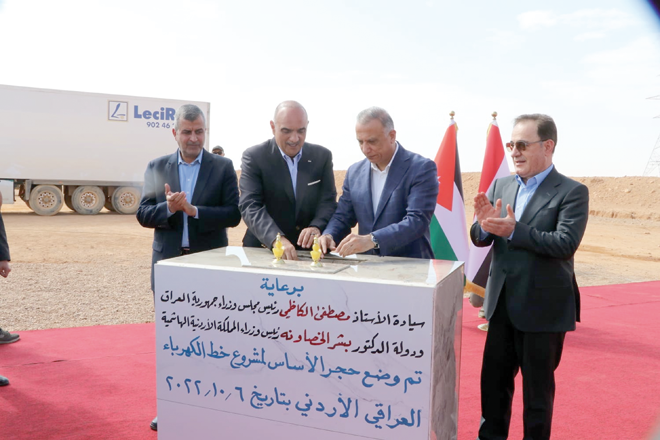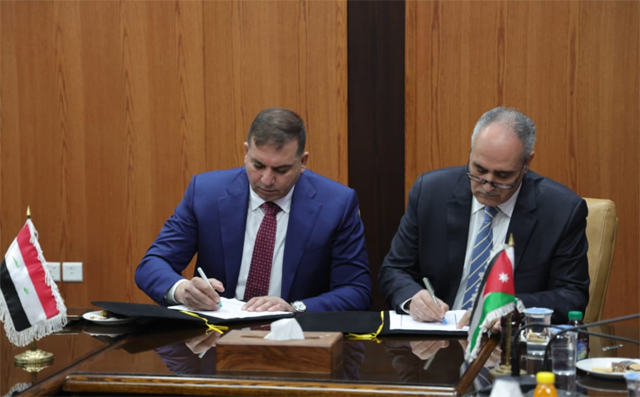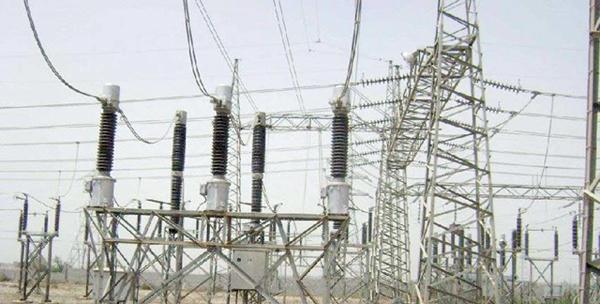You are here
Foundation laid for Jordanian-Iraqi electrical interconnection project
By JT - Oct 06,2022 - Last updated at Oct 06,2022

Prime Minister Bisher Khasawneh and Iraqi Prime Minister Mustafa Al Kadhimi on Thursday lay down the foundation stone for the Jordanian-Iraqi electrical interconnection project to be established within Iraqi territory close to the border between the two countries on Thursday (Petra photo)
AMMAN — Prime Minister Bisher Khasawneh and Iraqi Prime Minister Mustafa Al Kadhimi on Thursday laid down the foundation stone for the Jordanian-Iraqi electrical interconnection project to be established within Iraqi territory close to the border between the two countries.
The first phase of the Jordanian-Iraqi electricity interconnection project aims to supply Iraq with an electrical capacity of some 150 MW from Jordan, the Jordan News Agency, Petra, reported.
Jordanian-Iraqi partnership, notably in the field of energy, would witness a significant leap, thanks to the new interconnection project, Khasawneh said, noting that the government has prioritised relations with Iraq.
He also reiterated the “solid and strategic” ties with Iraq, expressing keenness to advance cooperation and integration in various fields to serve both nations.
He also emphasised Amman's full support for Baghdad towards enhancing the country's institutions, security and stability.
Khasawneh expressed hope that the electric interconnection project will achieve its objectives, which include strengthening the electrical interconnection system between the two countries, expanding Arab electrical interconnection to stabilise the system, and helping create a common electricity market towards regional prosperity.
Expressing hope that the project would be launched next summer, Khasawneh said that this "vital" partnership would bring about a set of projects in the near future.
Kadhimi said that this “exceptional effort” enhances the energy exchange between Iraq and Jordan, which demonstrates a policy of openness and cooperation.
Commending the partnership, Minister of Energy and Mineral Resources Saleh Kharabsheh said that the project would increase Jordan's electrical interconnection points with neighbouring countries, and offer room for indirect connectivity opportunities.
Iraq and Jordan are also seeking to interconnect with Saudi Arabia and the electrical interconnection system of the Gulf Cooperation Council countries, he said, adding that the Kingdom is also working with Egypt and Palestine to double exchange capability.
Iraqi Electricity Minister Adel Karim said that the first phase of the project, which extends from the Risha station to the Al Qaim region at a length of about 330 kilometres, aims to supply Iraq with 150 MW. The first phase is expected to be completed next summer, he added.
The project will later include a second phase with a supply of about 500 MW, and the third phase will supply some 900 MW, he added.
The Jordanian-Iraqi electrical interconnection project's first phase consists of the Risha Convertor Station Project 400/132/33 kV, which includes an air transmission line linking the Risha Convertor Station on the Jordanian side with the Al Qaim Convertor Station on the Iraqi side, as well as the installation of transformers in both countries.
Through this line, the electrical load of western Iraq, the Al Qaim region, will be supplied in isolation from the Iraqi electrical grid.
Also on Thursday, on the sidelines of the foundation stone laying ceremony of the electrical interconnection project between Jordan and Iraq, Khasawneh and Kadhimi discussed means to enhance cooperation and integration in various fields.
Khasawneh also expressed hope to speed up the implementation of joint strategic projects, notably the oil pipeline between Basra and Aqaba and the joint economic estate on the border between the two countries, Petra, reported.
Talks also drew attention to the importance of the trilateral joint cooperation mechanism between Jordan, Iraq and Egypt, which has set a model for regional coordination.
Related Articles
AMMAN — Jordan and Iraq signed the first amendment document to the electricity supply contract on Sunday, which will provide Iraq with 40 me
AMMAN — The tender to implement the first phase of the Jordan-Iraq power grid project will end on Monday, where the project, scheduled to be
AMMAN — Within the Arab power connection system, Jordanian-Iraqi electric connection is vital to enhance commercial relations and energy int
















